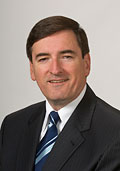
The Superior court of Alaska has ruled that Mayor Dan Sullivan’s Veto of the Anchorage Assembly’s ordinance putting a referendum repealing a controversial labor law, also known as The Responsible Labor Act or AO-37 on the April ballot shall stand.
Municipal Attorney Dennis Wheeler argued the case in Superior Court. He says he is not surprised by the decision.
“Prior Supreme Court case said that the Mayor’s veto power is sweeping and that unless there’s an express exception written into the charter, the Mayor can veto ordinances and we made that argument to this court and this court relying on that prior decision said that yes, the Mayor’s veto is sweeping and there’s no exception for moving a referendum.”
Assembly and Municipal attorneys disagreed whether the veto was legal and the issue was sent to court in December. In another case, The Supreme Court of Alaska ruled last week that the referendum to repeal the labor law can go forward. The Mayor contends that voter turnout will be larger at the later date and that will prevent special interest groups from influencing election results. The referendum could be scheduled for a special or regular election.
Daysha Eaton is a contributor with the Alaska Public Radio Network.
Daysha Eaton holds a B.A. from Evergreen State College, and a M.A. from the University of Southern California. Daysha got her start in radio at Seattle public radio stations, KPLU and KUOW. Before coming to KBBI, she was the News Director at KYUK in Bethel. She has also worked as the Southcentral Reporter for KSKA in Anchorage.
Daysha's work has appeared on NPR's "Morning Edition" and "All Things Considered", PRI's "The World" and "National Native News". She's happy to take assignments, and to get news tips, which are best sent via email.
Daysha became a journalist because she believes in the power of storytelling. Stories connect us and they help us make sense of our world. They shed light on injustice and they comfort us in troubled times. She got into public broadcasting because it seems to fulfill the intention of the 4th Estate and to most effectively apply the freedom of the press granted to us through the Constitution. She feels that public radio has a special way of moving people emotionally through sound, taking them to remote places, introducing them to people they would not otherwise meet and compelling them to think about issues they might ordinarily overlook.




